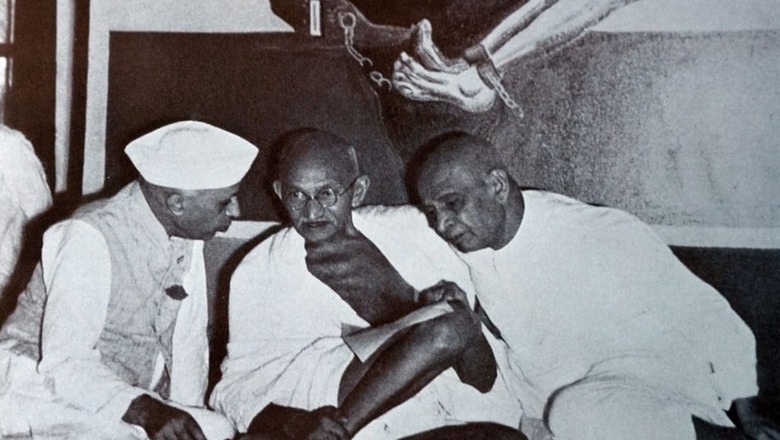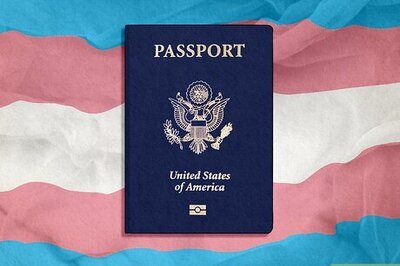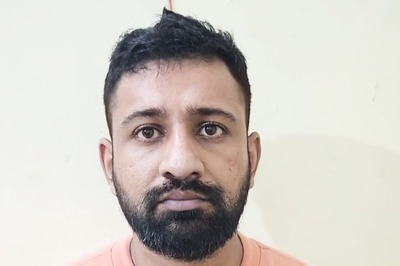
views
In deference to Gandhi’s wishes, Sardar Patel had toned down his speeches after the Red Fort trials of the INA trio of Shahnawaz Khan, Gurbaksh Singh Dhillon and P.K. Sehgal. Seriously worried by the inflammatory content of his speeches, which they took as inciting violence against the British administrators, governors of some provinces and the Viceroy complained to Gandhi. It worked. Before long, Patel took the leading role along with Gandhi in quelling the revolt of the Royal Indian Navy ratings, even convincing a reluctant Jawaharlal Nehru to condemn the uprising.
Matters came to a head again in August 1946. Responding to the Muslim League’s Direct Action Day slogan of ‘Ladke Lenge Pakistan’ (we shall fight and get Pakistan), Patel thundered, “The sword must be met by the sword.” He warned the League that Pakistan could not be achieved by the sword or bloodshed and wanted people to take recourse to violence, even if only in self-defence.
Such utterances did not go down well with his comrades. Pyrarelal Nayyar, Gandhi’s personal secretary, has hinted that Nehru voiced his complaints against Patel during his visit to Gandhi, who was then staying at Srirampur in Bengal, in the last days of 1946. On December 30, just as Nehru was to take his leave, Gandhi wrote to Patel: “I have heard many complaints against you…Your speeches tend to be inflammatory and play to the gallery. You have lost sight of all distinction between violence and non-violence. You are teaching people to meet violence with violence. You miss no opportunity to insult the Muslim League in season and out of season. If all this is true, it is very harmful. They say you talk about holding on to office. This also is disturbing, if true.”
Patel defended himself strongly in his reply, arguing that the complaints “are not only false but some of them are beyond my imagination.” He guessed that “these accusations must have been dinned into your ears by Mridula (Sarabhai, the new general secretary of the Congress) for she has made it her pastime to heap abuses upon me.” Patel accused Sarabhai of “indulging in a nauseating propaganda that I want to get rid of Jawahar and also found a new party.” Soon, everything else was overtaken by the widespread communal riots and the process of transfer of power at a breakneck speed after the arrival of the last viceroy, Louis Mountbatten.
Before the year was out after the transfer of power, the relationship between Patel and Nehru had soured to such an extent that both offered to resign. The bone of contention was Patel’s annoyance over Nehru stepping on his ministerial toes and Nehru’s demand for unfettered freedom to take any measure that he felt needed without being constrained by boundaries of ministerial jurisdiction.
Their cabinet colleague N.V. Gadgil observed in his memoirs, “…the schism between the viewpoint of Vallabhbhai and Nehru began to come to surface gradually…The differences between them became sharper as time went on. Nehru was not pleased by the action taken in Junagarh by Vallabhbhai. He was equally displeased at the firmness displayed by Vallabhbhai in the Hyderabad affair…The differences between Nehru and Patel on how to deal with Muslims continued to grow.”
The differences extended to their political preferences too. While Nehru’s fondness for Jayaprakash Narayan led him to try repeatedly to have the socialist leader on his side, Patel held diametrically opposite views. In June 1948, Patel wrote to Nehru, “I have all along been of the view that if the future of India is in the hands of men like Jai Prakash [sic], it would probably be a most unfortunate circumstance,” adding, “I sincerely feel that it is time he was pulled up.”
Gandhi too wasn’t very kind to Patel in his public utterances. He complained that Patel was no more his “yes-man as he was once popularly and affectionately nicknamed.” In the way of explaining the phrase, Gandhi said, “When he was my ‘yes-man’, he permitted himself to be so named, because whatever I said instinctively appealed to him…When power descended on him, he saw that he could no longer successfully apply the method of non-violence which he used to wield with signal success.”
Resolving the conflict between the two old comrades, unfortunately, became one of the last preoccupations of Gandhi before his assassination. Towards the end of December 1947, Gandhi told Patel, “Either you should run things or Jawaharlal should,” in response to which Patel expressed his desire to move out due to his age but promised to assist Nehru to the extent possible from the outside. Gandhi continued to ponder over their written notes submitted to him. Nehru and Patel also shared their notes submitted to Gandhi with each other and tried to fix a mutually convenient date to meet their mentor together, but before that could happen, Gandhi was gone.
Matters had worsened with the Indian government’s decision to withhold the payment of Rs 55 crore to Pakistan, a decision that was primarily driven by Patel with the strong support of Syama Prasad Mookerjee, Gadgil and BR Ambedkar. Nehru played along. Gandhi’s fast in protest was bound to be perceived by Patel as a rebuke. One of the meetings with Gandhi on this matter, where apart from Patel, Nehru, RK Shanmukham Chetty and John Matthai were also present, turned out to be a crucial one. According to Manibehn Patel and V. Shankar, Patel’s private secretary, in that meeting Gandhi wept and Patel spoke some ‘extremely bitter words’. Patel ‘reeled under the blow and was considerably embittered’. He broke down and wept when the cabinet reversed its earlier decision to release the money to Pakistan.
However, the dedicated and loyal soldier that he was, Gandhi’s anguish was too much for Patel to bear, and he wanted to step down. He wrote to Gandhi, “The sight of your anguish yesterday has made me disconsolate. It has set me furiously thinking.”
Patel poured his heart out in the letter which makes a painful reading. “The burden of work has become so heavy that I feel crushed under it. I now see that it would do no good to the country or to myself to carry on like this anymore. It might even do harm. Jawahar is even more burdened than I. His heart is heavy with grief. Maybe I have deteriorated with age and am no more any good as a comrade to stand by him, and lighten his burden. The Maulana (Azad) too is displeased with what I am doing and you have again and again to take up cudgels on my behalf. This also is intolerable to me. In the circumstances, it will perhaps be good for me and for the country if you now let me go. I cannot do otherwise than I am doing. And if thereby I become burdensome to my lifelong colleagues and a source of distress to you and still I stick to office, it would mean—at least that is how I would feel—that I let the lust of power blind my eyes and so was unwilling to quit. You should quickly deliver me from this intolerable situation.”
Gandhi’s death was an irreparable loss to both, and as in life, in death too, Gandhi brought them back together. “In this crisis that we have to face now after Bapu’s death, I think it is my duty and, if I may venture to say, yours also, for us to face it together as friends and colleagues,” Nehru wrote to Patel on February 3, 1948. Patel reciprocated by writing to Nehru on February 5, “I am deeply touched, indeed overwhelmed, by the affection and warmth of your letter…I fully and heartily reciprocate the sentiments you have so feelingly expressed.”
The camaraderie notwithstanding, the differences between the two were by now known widely, which Nehru admitted indirectly in his letter. “I have been greatly distressed by the persistence of whispers and rumours about you and me, magnifying out of all proportion any differences we may have,” Nehru wrote, attempting to play down the schism. However, he had no explanation for the existence of such rumours if they had no basis. He admitted that “this has spread to foreign ambassadors and foreign correspondents; mischief makers take advantage of this and add to it. Even the Services are affected and this is bad. We must put an end to this mischief.”
That these were not mere rumours and blaming ‘mischief makers’ was more of a wishful thinking became clear repeatedly. The clash of personalities continued until the death of Patel in December 1950, the last big conflict being over the election of the Congress president. In the presidential elections that year, with Patel’s support, Purushottam Das Tandon defeated J.B. Kripalani who was sponsored by Nehru. “Tandon is being supported fully by Vallabhbhai Patel. This in spite of the fact that I informed him and others that if Tandon is elected, I could not be in the Congress Working Committee and very probably I would resign from the Prime Ministership,” Nehru complained to V.K. Krishna Menon.
It would be a fascinating study as to how two personalities, so different in practically all aspects of life, remained so attached to a common mentor who didn’t hesitate to display his preference for one over the other.
Chandrachur Ghose is author of the national bestsellers ‘1947-57, India: The Birth of a Republic’ (2023) and ‘Bose: The Untold Story of an Inconvenient Nationalist’ (2022), both published by Penguin. Views expressed in the above piece are personal and solely those of the author. They do not necessarily reflect News18’s views.



















Comments
0 comment